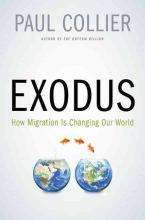 Exodus discusses the costs and benefits of mass migration. Paul Collier (author of “The Bottom Billion”) looks at migration from the viewpoint of the migrants, the population of the receiving country and the population of the country of origin. Most people about migration argue either that it is good or bad. They address the wrong question, says Mr Collier. The right one is: how much more migration would be beneficial, and to whom?
Exodus discusses the costs and benefits of mass migration. Paul Collier (author of “The Bottom Billion”) looks at migration from the viewpoint of the migrants, the population of the receiving country and the population of the country of origin. Most people about migration argue either that it is good or bad. They address the wrong question, says Mr Collier. The right one is: how much more migration would be beneficial, and to whom?
Collier identifies 3 factors that determine the migration rate: the width of the income gap (which he sees as a temporay distortion during which prosperity is not yet globalised), the income level in the country of origin and the size of the diaspora (and the absorption rate). The second factor implies that migration might increase when a country of origin becomes richer, as more people are able to afford the trip. The absorption rate is the speed with which migrations adopt the norms of the host society. The rate tends to decrease with the size of the migrant community in a country, as new arrivals have fewer incentives to adopt norms of the host country when there is already a large diaspora network. Therefore, initiatives (language programmes, geographical spreading, apprenticeship programmes) that help to increase the absorption rate are useful, as they can sustain a higher migration rate. Such policies explain why the US has a higher absorption rate than France.
Migration makes migrants better off. If it did not, they would go home. Those who move from poor countries to rich ones quickly start earning rich-country wages, which may be ten times more than they could have earned back home. “Their productivity rockets upwards,” says Mr Collier, because they are “escaping from countries with dysfunctional social models”. This is crucial. Most rich countries are rich because they are well organised, and poor countries are poor because they are not. Nationalism has positive aspects as it enables people to cooperate beyond the family or clan level and to redistribute resources. Cooperation requires trust and easily breaks down (e.g. free riders) . As other did (Acemoglu and Robinson), he points to the importance of inclusive (rather than extractive) institutions and trust in the development of a country. High-trust societies have the institutions and norms that enable development. France is richer than Nigeria because its social model is superior. A factory worker in Nigeria produces less than he would in France because the society around him is dysfunctional: the power keeps failing, spare parts do not arrive on time and managers “are busy battling bribe-hungry bureaucrats”. When a rich country lets in immigrants, it is extending to them the benefits of good governance and the rule of law.
What of the countries that receive immigrants? Mr Collier argues that they have benefited from past immigration, but will probably suffer if it continues unchecked. Continued mass immigration threatens the cultural cohesion of rich countries. There is a trade-off between positive effects of cultural variety (no real demographic positive effects) and negative effects on social cohesion, but these effects play with different groups in society. The young, affluent middle classes are the big beneficiaries of variety. In contrast, those people on benefits like social housing or welfare, whether because they are unemployed or pensioners, experience most competition from immigrants and are the most vulnerable to the weakening of cohesion. Collier refers to the work of Robert Putnam in the US who showed how immigration lead to a decrease of trust, not only between indigenous population and immigrants, but also among the indigenous population (“hunkering down”). This has effects on people’s willingness to support welfare policies. A shared sense of identity is a condition for social redistribution. People need to see people who need state welfare as themselves minus the good luck.
Finally, Mr Collier looks at the effect of emigration on poor countries. Up to a point, it makes them better off, dispelling notions of “brain drains”. Emigrants send good ideas and hard currency home. The prospect of emigration prompts locals to study hard and learn useful skills; many then stay behind and enrich the domestic talent pool instead. But if too many educated people leave, poor countries are worse off. Big emerging markets such as China, India and Brazil benefit from emigration, but the smallest and poorest nations do not: Haiti, for example, has lost 85% of its educated people.
Collier is quite pessimistic, but it is hard not to see the recent surge in populism and anti-immigration policies as a vindication of his warnings. As Milanovic did, he suggests looking into ways to give immigrants a special statute (e.g. higher taxes, temporary residency, limited access to social welfare). These policies might seem discriminatory or harsh, Collier writes, they might be better than the current situation, both for the countries of origin and for the countries of destination.